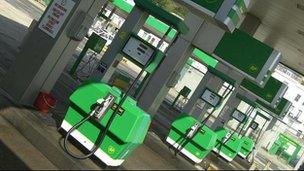Spring petrol sales decline despite lower forecourt prices
- Published
- comments

Nearly half a billion fewer litres of petrol and diesel were sold between April and June than during the same period last year, says the Department of Energy and Climate Change.
The reduction came despite a fall in fuel prices during the period.
It came after sales rose at the start of the year when the threat of a tanker drivers' strike saw panic buying.
Motoring organisation the AA said price rises since 2008 have contributed to a "steady decline" in the overall market.
The government figures show that more than 2 billion fewer litres of petrol and diesel were sold compared with the same period in 2008, before the recession.
In the first half of this year, a total of 16.7 billion litres of fuel was sold on forecourts in the UK.
This compares with total sales of nearly 19 billion litres between January and June 2008.
'Fair deal'
In the first three months of this year, meanwhile, there was a rise in petrol sales of almost 120 million litres compared with the same period in 2011.
Demand for fuel shot up at the end of March after ministers urged people to stock up amid threats of a strike by tanker drivers.
But the government rejected claims by retailers their advice had caused panic buying.
Petrol Retailers Association chairman Brian Madderson told BBC Radio 5 liveBreakfast that, during a week of "government-inspired panic buying", sales of petrol "got up to over a 170% of its normal rate".
"So by the end of March everybody with a car had their tanks full of petrol and, of course, after that, in the second quarter, sales fell off the cliff."
The AA blamed the slump on the fuel industry for "trying to squeeze more money out of shrinking customer demand".
Its president Edmund King acknowledged that panic buying - as well as wet weather - may have played a part in the April-June fall.
"However, petrol prices slumped more than 10p a litre - from the record of 142.48p a litre in mid-April to the low-point of 131.19p at the end of June - and UK drivers began to travel further with lighter evenings, bank holidays and the Queen's Diamond Jubilee celebrations," he said.
He added: "While we welcome the fact that new cars have become more fuel-efficient, this goes nowhere near to accounting for the crash in demand over the past three months, and the past five years."
He said the fall in sales since 2008 had to "bring some sense of reality to the fuel market and the government".
"However, we have seen the fuel industry trying to squeeze more money out of shrinking customer demand, as was the case when wholesale diesel was cheaper than petrol in early spring but drivers and businesses were forced to pay 5p a litre more.
"Price transparency is the way forward - to ensure and show drivers that they are getting a fair deal at the pump."
Meanwhile, the AA's head of motoring Paul Watters warned that ministers may have to look elsewhere to make up lost tax revenues.
"We've heard talk of the government finding a real struggle in getting the revenues in that it was expecting and this dramatic drop won't help them one iota," he told BBC Radio 5 live.
"It will make them a bit desperate, perhaps looking towards road pricing again or looking towards squeezing more out of the tax disc that we all pay for."
A spokesman for the Department of Transport has yet to respond to a request for a comment.
- Published22 September 2012
- Published19 July 2012